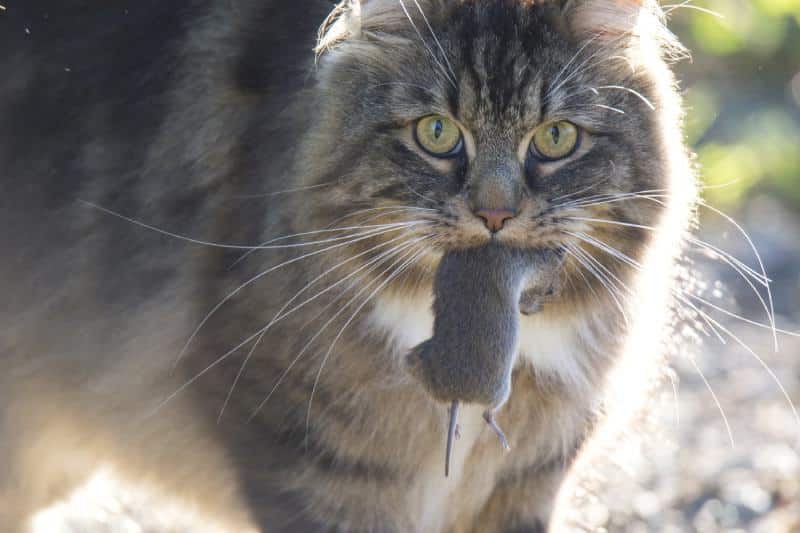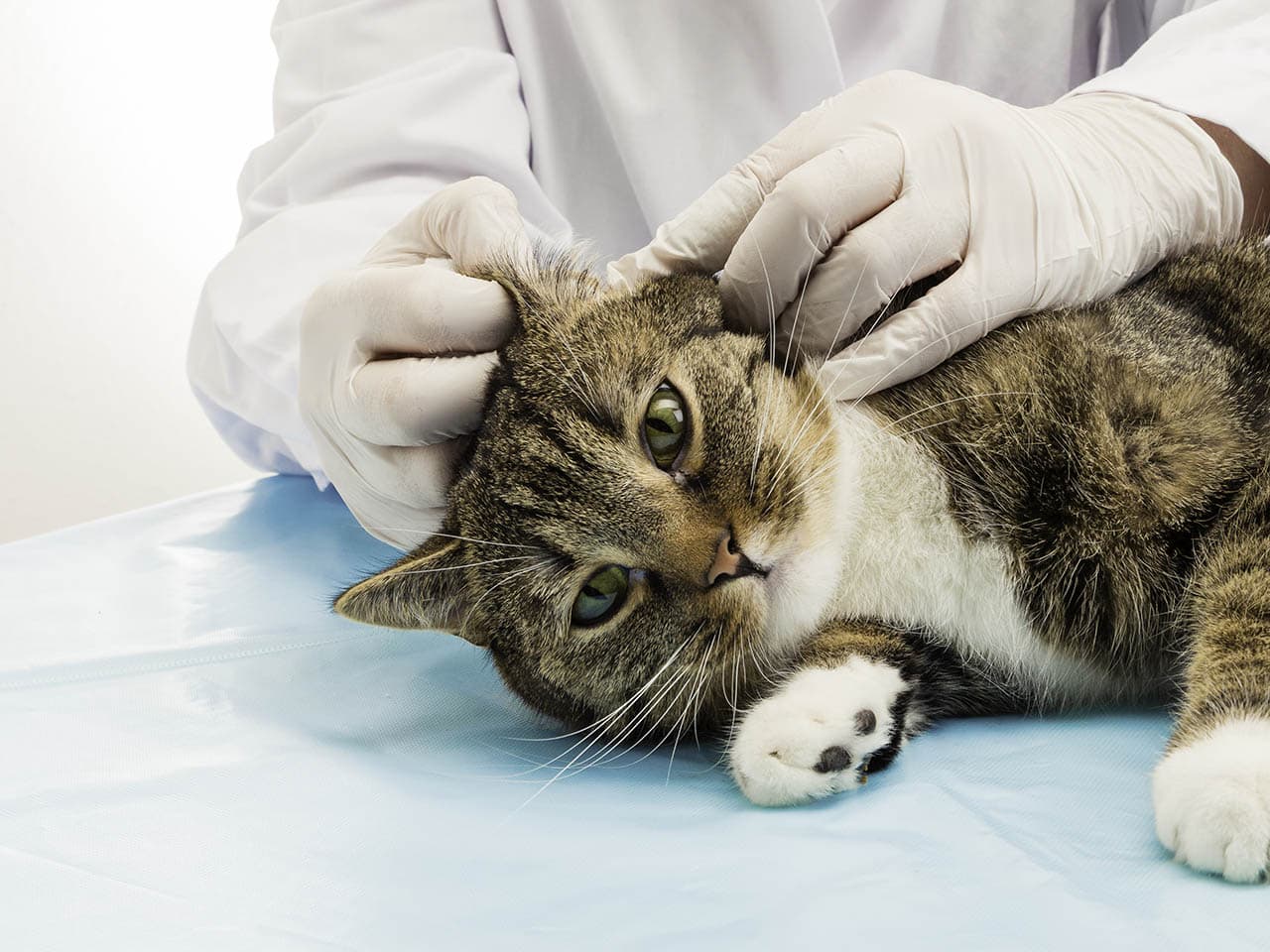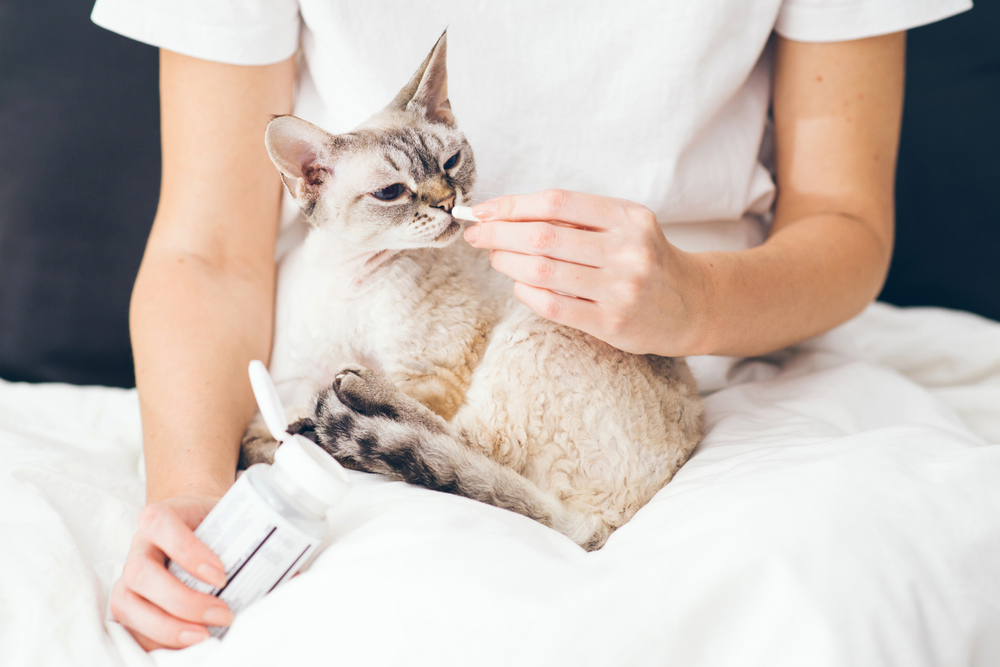It’s not uncommon for our furry friends to find themselves in trouble after eating something they shouldn’t have. If your cat ate rat poison, they must be seen by a veterinarian. Why? Because rat poison is designed to poison (and kill). Sadly, it not only targets rodents but can also kill other animals, including our precious pets. Your veterinarian can save your kitty, but you’ll need to call them immediately after they’ve eaten rat poison.
How Do Cats Act When They Are Poisoned With Rat Poison?
At first (especially if you just saw them eat it), you won’t notice anything odd, and your cat will act completely normal. Don’t be fooled; rat bait can take time before it poisons animals. Many rat poisons will have different active ingredients. The impact on your cat will depend on the poison they ate.
Anticoagulants (e.g., warfarin, brodifacoum) can take several days to take effect, while others, like bromethalin or strychnine, can make your cat ill within hours. However, it doesn’t matter which poison they ate—as soon as you know they ate poison, you should call the veterinarian. This will increase your kitty’s chance of survival.
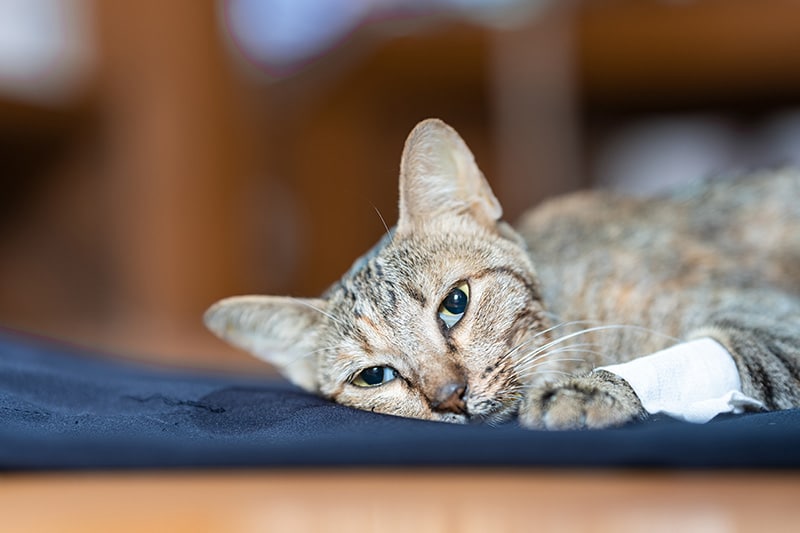
What Are the Signs of Rat Poisoning in Cats?
| Anticoagulants | Bromethalin | Cholecalciferol | Zinc Phosphide | Strychnine |
| • Weakness | • Weakness | • Thirst and peeing more (kidney failure) | • Vomiting (possibly with blood) | • Anxiety |
| • Rapid breathing (breathing through their mouth) or cough | • Tremors | • Vomiting (possibly with blood) | • Restlessness | • Stiffness |
| • Pale gums | • Seizures | • Diarrhea or constipation | • Weakness | • Seizures |
| • Red spots on gums | • Wobbliness | • Heart problems | • Breathing problems | • Restlessness |
| • Bruising on skin | • Paralysis | • Lethargy | • Seizures | • Increased reaction to noise, light, or touch |
| • Tummy pain | • Vomiting | • Weakness | ||
| • Tremors | • Coma | |||
| • Cold to touch | ||||
| • Black or dark poop | ||||
| • Nose bleeds | ||||
| • Blood in their pee | ||||
| • Seizures |
What Do I Do if My Cat Ate Rat Poison?
- Don’t try to make your cat vomit. If weak from the effects of the poison, they might inhale some of the vomit, which can be fatal.
- Remove any remaining bait to stop your cat (or other pets) from eating more.
- Find out what type of poison it is and roughly how much is missing (don’t worry if you don’t know; your cat can still be treated).
- Call your local veterinary clinic to tell them what has happened; if they are closed, call the emergency clinic.
- If your cat is weak, they may have internal bleeding. You need to keep them warm by wrapping them in a blanket and placing them in their carrier for secure transport to the clinic.

What Happens if Cats Eat a Poisoned Rat or Rat Poison?
Cats are natural predators, and a weak or poisoned rodent is an easy catch for your furry friend. Unfortunately, our cats can get just as sick and die from eating a poisoned rat as they can from eating poison straight off the ground; it’s called secondary poisoning. No matter how your kitty has been poisoned, they need to see the vet.
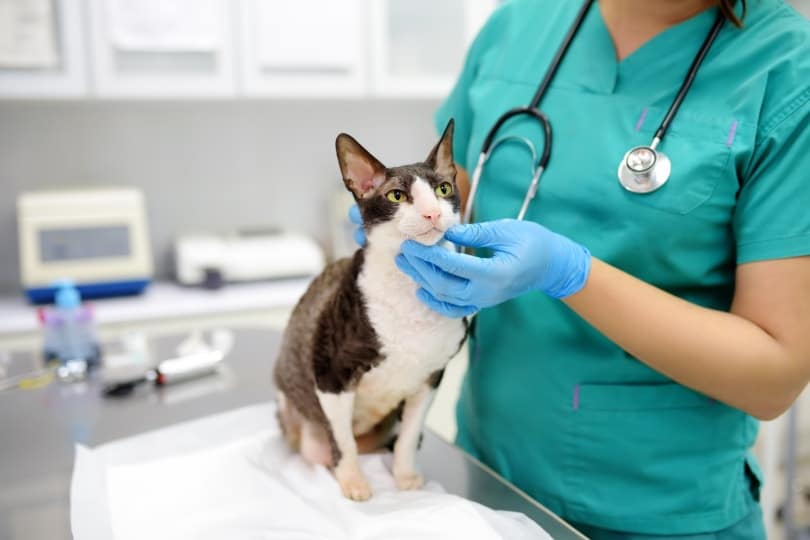
Assessment
Once at the clinic, your cat will be assessed for signs of poisoning (listed above). Your veterinarian will choose the best treatment based on three main questions:
- When did your cat eat the poison?
- What poison did they eat?
- Does your cat have symptoms of poisoning?
If your cat is lucky, you caught them eating the bait and got them to the clinic ASAP.
Treatment for Cats Without Symptoms
- Making your cat vomit to bring up the poison.
- Giving activated charcoal (binds the poison to stop it from absorbing into your cat’s blood).
- Blood tests to check for side effects of poison.
Most cats that get this treatment will recover well, and often, you can take them home the same day.
Treatment for Cats With Symptoms
It can be more complex to treat cats showing signs of rat bait poisoning. Your cat’s treatment will depend on the type of poison they have eaten and what signs they have. They may need to stay at the clinic overnight for their treatment.
You can expect your cat to be on a fluid drip. A blood transfusion might be necessary for anemic cats that have eaten an anticoagulant bait; vitamin K is given as an antidote for these types of poison. It may take several days for your veterinarian to stabilize your cat if they have signs of poisoning.

Will My Cat Be OK if He Ate Rat Poison?
The cats that do best after eating rat poison are treated promptly, display no signs, and have eaten anticoagulants that can be treated with antidotes (vitamin K). With these kitties, there’s a high chance of survival.
Sadly, we can’t say for sure that your precious pet will be OK after eating rat bait, and some cats die. Once cats display signs, the treatment is more challenging. Products that don’t have a specific antidote (i.e., those that are not anticoagulant-based) are more dangerous if eaten. They take effect more rapidly, meaning your cat has less time to get to the veterinary clinic.
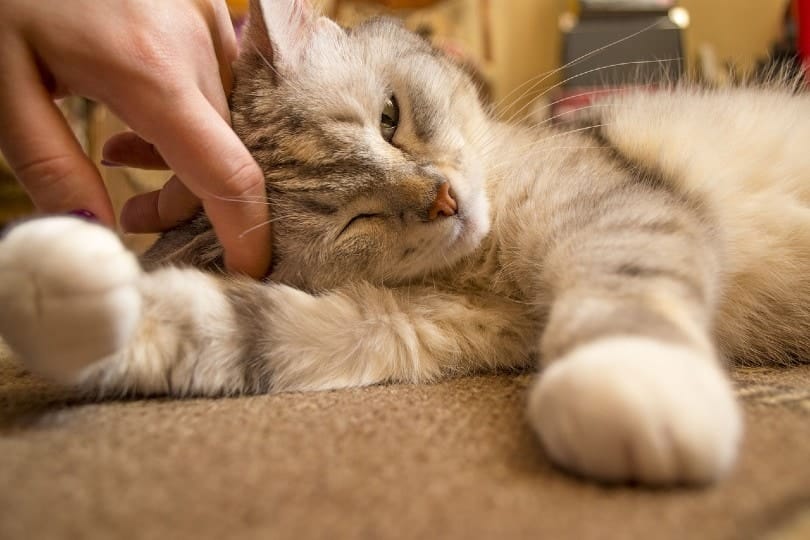
Will Rat Poison Kill My Cats?
Rat poison can kill cats, especially if not treated early. Don’t hesitate to get your cat to your veterinarian if you think there is a chance he has eaten rat poison, even if he seems fine.
What Rat Poison Is Safe for Cats?
There isn’t any “safe” rat poison. Poison is intended to harm and can kill all animals. Some poisons, like warfarin and other anticoagulant baits with an antidote, can give your cat a better chance of survival if eaten. For a treatment to be successful, your cat still needs to be seen quickly by a veterinarian.

How Do I Stop My Cat from Eating Rat Poison?
- Don’t use rat poison anywhere where there are pets (humane trapping is another option).
- Find a professional to help if you have a rodent problem; tell them you have pets.
- Lock bait away to prevent accidental ingestion.
- Follow professional advice or packet instructions carefully.
- Check your garden or yard regularly for stray bait or dead rodents; dispose of dead rodents safely to prevent secondary poisoning.
- Use bait blocks (secured), not seeds—seeds can be moved and spread by rodents, making the poison more accessible to your pet.
- Don’t lay poison down if you don’t have a rodent problem!
Conclusion
Cats that eat rat poison need to be seen by a veterinarian as soon as possible. Your cat can seem fine initially, but some poisons can take several days before they take effect. Your kitty will have the best chance of surviving if you can get them to the veterinary clinic before they show signs of being poisoned.
Related Read:
- My Cat Drank Bleach! Here’s What to Do! (Vet Answer)
- How to Tell if Your Cat is Having a Seizure — 3 Signs to Look For
Featured Image Credit: Taavo Kuusiku, Shutterstock
Contents
- How Do Cats Act When They Are Poisoned With Rat Poison?
- What Are the Signs of Rat Poisoning in Cats?
- What Do I Do if My Cat Ate Rat Poison?
- What Happens if Cats Eat a Poisoned Rat or Rat Poison?
- Will My Cat Be OK if He Ate Rat Poison?
- Will Rat Poison Kill My Cats?
- What Rat Poison Is Safe for Cats?
- How Do I Stop My Cat from Eating Rat Poison?
- Conclusion

